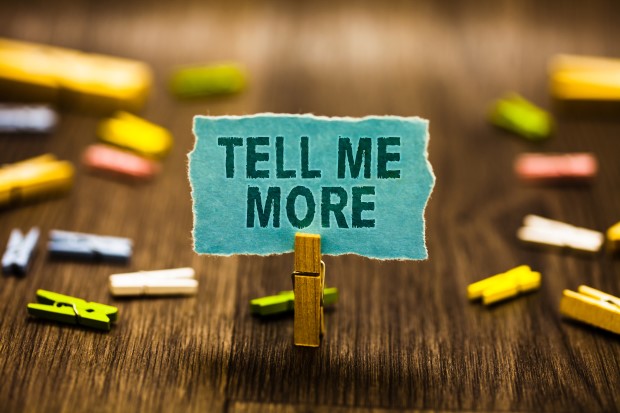
When we think about what we’re looking for in a partner, one of the most important criteria is someone who can love and value us as the unique beings we are, with all of our imperfections and strengths. Our partner’s acceptance instills in us feelings of safety, openness, and passion. All of this comes easily in Stage One, when our differences seem charming or even exciting. As we journey deeper into love, however, the differences between us begin to challenge instead of charm, and we need to develop new skills to help us return to that place of mutual warmth and trust. One key skill is the capacity to genuinely listen.
Three Magic Words
We often equate the expression “three magic words” with “I love you.” But there are three other magic words that can allow you to discover important things about your partner (and others) that you’d never have imagined. Just as important, these words will help your partner to feel deeply cared about and seen — and to want to respond to you in kind. The words are, “Tell me more.”
“Tell me more” is a powerful phrase when backed by a genuine willingness to pay attention to the answers. Listening with true presence — that is, taking in what the other is saying without judging, suggesting, or trying to fix — is a gift that we can offer another person. As author and National Humanities Award recipient Krista Tippett has said, “Listening is about being present, not just about being quiet.” Fundamentally, it’s about recognizing that the conversation is about the other, not about you.
Too often, a conversation goes like this:
Shanice: I had a tough day today.
Evan: Oh, your job is always getting you down.
or
I’m worried that you’re not getting enough sleep.
or
Well, the problem is that your boss is a jerk.
But if Evan used the three magic words, the conversation would go very differently:
Shanice: I had a tough day today.
Evan: Oh? Tell me more.
Shanice: My mind just isn’t on my work.
Evan: What are you thinking about?
Shanice: I’ve been thinking about my grandfather a lot lately for some reason. He’s on my mind so much that I can’t seem to focus like I want to.
Evan: That’s interesting. What is it about your grandfather that’s gotten your attention?
Shanice: Well, he was so important to me when I was a kid, and I miss him a lot. Oh wow, I just realized the tenth anniversary of his death is this week.
Evan: How do you think that’s affecting you?
Shanice: Well, until this moment, I hadn’t realized it was the anniversary. Until we started talking, I had no idea why I’ve been so distracted. Huh. You know, I think I need to spend some time with my grandmother. Visiting Grandma is exactly what I need to do. I bet she’s missing him too. We can miss him together.
In the second version of the exchange, Evan doesn’t take the conversation in a predetermined direction — that is, where he wants it to go or where he thinks it might or should go. Instead, he decides to truly hear her. He is able to see Shanice as different from himself, and because of this, she is able to discover what’s really bothering her and even find a way to help herself.
Try this with your partner, your neighbor, your cousin, or anyone else who calls just to catch up. When they tell you something about their life, say, “Tell me more.” And keep listening. Let them dive deeper and deeper into their thoughts and feelings. Notice what happens.
Listening is one of the most powerful ways we let other people know they are important to us. How we respond when they are talking is critical, but another component is important as well: recalling later what they said. For example, in the story above, Evan might follow up a few days later and ask if Shanice had any more thoughts about her grandfather or visiting her grandmother.
And listening isn’t just good for the person being heard — it’s good for the listener as well. When we feel close to another person, our brains release oxytocin, the chemical that promotes bonding. Just think about those times you’ve felt a genuine sense of intimacy with someone else when you were laughing together, crying together, or feeling truly heard and understood. It’s exciting to feel so connected, and at the same time it’s deeply calming, like stroking a pet or sitting by the ocean.
Excerpted from the book Love Skills. Copyright ©2020 by Linda Carroll. Printed with permission from New World Library — www.newworldlibrary.com


